
I wanted to define the vocabulary of a wedding both visually and intellectually. The book is about more than weddings or wedding dresses. It's a metaphor for women's lives, their creativity.
Vera Wang's statement underscores a profound approach to understanding and interpreting an event as culturally significant as a wedding. She emphasizes the importance of both visual and intellectual elements, suggesting that a wedding is not merely a festive occasion but a complex cultural symbol that reflects deeper aspects of identity and personal expression. The idea of defining a 'vocabulary' indicates a desire to articulate the myriad ways in which wedding elements—such as dresses, setting, rituals—serve as visual representations of societal values, personal choices, and creative expression. Wang extends this metaphor beyond the mere aesthetics, positioning weddings as a canvas for women's lives, showcasing their creativity, individuality, and autonomy. This perspective invites us to view wedding traditions not as static customs but as dynamic symbols capable of evolving alongside women's changing roles and self-perceptions. It encourages a broader understanding of what wedding attire and rituals imply—beyond tradition—to creative and personal storytelling. By framing weddings as a metaphor for women's lives, Wang elevates the personal and artistic significance of these moments, celebrating the uniqueness and resilience of women through their choices and representation. Her approach inspires a reevaluation of traditions, inviting contemporary reinterpretation that aligns with evolving notions of femininity, creativity, and personal autonomy.










